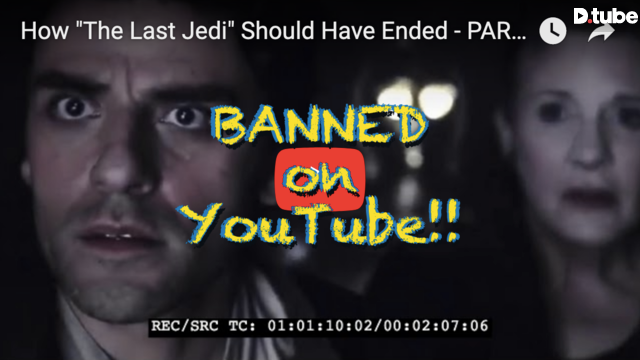
I am still working on my vlog video for D.tube, but in the meantime, I am putting up an old parody that was blocked worldwide. I worked very hard on the sound design, re-edits, timing, and some thoughtful production design with the material already at hand.
Other social media producers have done "How It Should Have Ended" webisodes, but I was given the most difficult time ever.
I do not think the link works at all, but I am willing to try and see. Please leave a comment if you are able to watch it to the very end.
Since I am not making an outright copyright claim of this content, please read the following:
A parody (/ˈpærədi/); also called a spoof, send-up, take-off, lampoon, play on (something), caricature, or joke, is a work created to imitate, make fun of, or comment on an original work—its subject, author, style, or some other target—by means of satiric or ironic imitation.
Fair use is a doctrine in the law of the United States that permits limited use of copyrighted material without having to first acquire permission from the copyright holder. Fair use is one of the limitations to copyright intended to balance the interests of copyright holders with the public interest in the wider distribution and use of creative works by allowing as a defense to copyright infringement claims certain limited uses that might otherwise be considered infringement.
Parodies are protected under the fair use doctrine of United States copyright law, but the defense is more successful if the usage of an existing copyrighted work is transformative in nature, such as being a critique or commentary upon it.
In August 2008, Judge Jeremy Fogel of the Northern District of California ruled in Lenz v. Universal Music Corp. that copyright holders cannot order a deletion of an online file without determining whether that posting reflected "fair use" of the copyrighted material. The case involved Stephanie Lenz, a writer and editor from Gallitzin, Pennsylvania, who made a home video of her thirteen-month-old son dancing to Prince's song Let's Go Crazy and posted the video on YouTube. Four months later, Universal Music, the owner of the copyright to the song, ordered YouTube to remove the video under the Digital Millennium Copyright Act. Lenz notified YouTube immediately that her video was within the scope of fair use, and she demanded that it be restored. YouTube complied after six weeks, rather than the two weeks required by the Digital Millennium Copyright Act. Lenz then sued Universal Music in California for her legal costs, claiming the music company had acted in bad faith by ordering removal of a video that represented fair use of the song.[31] On appeal, the Court of Appeals for the Ninth Circuit ruled that a copyright owner must affirmatively consider whether the complained of conduct constituted fair use before sending a takedown notice under the Digital Millennium Copyright Act, rather than waiting for the alleged infringer to assert fair use. 801 F.3d 1126 (9th Cir. 2015). "Even if, as Universal urges, fair use is classified as an 'affirmative defense,' we hold—for the purposes of the DMCA—fair use is uniquely situated in copyright law so as to be treated differently than traditional affirmative defenses. We conclude that because 17 U.S.C. § 107 created a type of non-infringing use, fair use is "authorized by the law" and a copyright holder must consider the existence of fair use before sending a takedown notification under § 512(c)."
In Campbell v. Acuff-Rose Music Inc[11] the U.S. Supreme Court recognized parody as a potential fair use, even when done for profit. Roy Orbison's publisher, Acuff-Rose Music, had sued 2 Live Crew in 1989 for their use of Orbison's "Oh, Pretty Woman" in a mocking rap version with altered lyrics. The Supreme Court viewed 2 Live Crew's version as a ridiculing commentary on the earlier work, and ruled that when the parody was itself the product rather than mere advertising, commercial nature did not bar the defense. The Campbell court also distinguished parodies from satire, which they described as a broader social critique not intrinsically tied to ridicule of a specific work and so not deserving of the same use exceptions as parody because the satirist's ideas are capable of expression without the use of the other particular work.
Don't get me wrong. I am not doing this for profit. And I may not see Fair Use justice in my short lifetime. I am just a creative looking for a wholesome outlet, somewhere I can belong.
I don't think I can hurt Disney machine at all. They have bigger guns and all the money in the world.
Poor Lil Old Me: I really have nothing. I won't win.
But I'll wear that sh!t-face grin to the Very End.
So, here goes nothing!
(clicks the "Publish Video" button)
#tormentedartist #torturedclown #dontshootthecomedian
▶️ DTube
▶️ YouTube